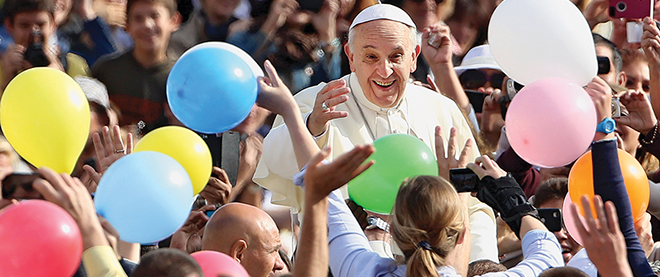Pope Francis: The unlikeliest liberal hero?
Perhaps just for now, as Jaime Weinman explains
Franco Origlia/Getty Images
Share

Two major magazines named Pope Francis “Person of the Year” for 2013. Time wasn’t a big surprise, but the other one was. It was the venerable gay-rights magazine The Advocate, which praised the new Pope for his “stark change in rhetoric” on homosexuality. It was the culmination of something that would have seemed inconceivable under the last two popes: Social liberals actually like the guy. In fact, in America, he may be more popular with liberals than conservatives: A Washington Post/ABC poll found that while Francis is popular throughout the country, he’s approved of by 72 per cent of self-identified liberals but only 57 per cent of conservatives. Another poll, from NBC, found that only 45 per cent of conservatives and 48 per cent of Tea Party supporters approve of his work. For the leader of a socially conservative institution that still bans abortion, gay marriage and female priests, this is a startling turnaround.
But then, unlike his predecessor, Pope Benedict, who was widely disliked among liberals, Francis seems to have gone out of his way to emphasize issues that liberals are comfortable with. The Catholic Church has usually been, broadly speaking, economically liberal and socially conservative. But while Benedict tended to stress the social conservatism, Francis’s speeches have been dominated by economic matters: In attacking “the idolatry of money” and speaking out against trickle-down economics, he seems to have built his papacy around the theme of the corrupting influence of wealth, possibly including the wealth of his own institution.
As for social and sexual topics, he tends to downplay or soften them. His instantly famous statement on gay priests—“Who am I to judge?”—was not a contradiction of traditional teachings, but a sign that this won’t be his major concern, and he has continued to make that clear. “We cannot insist only on issues related to abortion, gay marriage and the use of contraceptive methods,” he said. He added that, while Church teachings on these matters are clear, it’s pointless to talk about them all the time, comparing an emphasis on cultural matters to asking “a seriously injured person if he has high cholesterol.” And soon after he was crowned by The Advocate, he sent another signal of his new tone by reducing the power of a conservative U.S. cardinal, Raymond L. Burke, who had criticized the Pope’s squishiness on abortion and homosexuality.
For every comfortable liberal, there’s an equal and opposite discomfited conservative. After Francis’s statement on trickle-down economics, Rush Limbaugh tore into him, saying “somebody has either written this for him or gotten to him. This is just pure Marxism coming out of the mouth of the Pope.” Catholic conservatives have been more muted in their criticism, but Michael Novak, a prominent Catholic conservative, called some of Francis’s points “highly partisan and biased” (though he quickly blamed the liberal media for picking these phrases out of a long speech) and somewhat condescendingly implied that Francis’s experiences in Argentina led him to misunderstand the value of capitalism in other countries. Under popes who placed more emphasis on issues such as abortion, it was easier for conservatives to accuse liberals of being “cafeteria Catholics,” unwilling to follow doctrine they didn’t like; with Francis’s different set of priorities, conservative Catholics may face the same accusation.
That doesn’t change the fact that the affection of liberals for Pope Francis might turn out to be a fragile one: While he may be de-emphasizing social issues for the moment, there’s no indication that he plans to change the Church’s position on any of them. Still, with many liberals frustrated by the reluctance of powerful people to speak out about income inequality—U.S. President Barack Obama’s December speech on the subject struck many as too little, too late—they were overjoyed by Francis’s forthrightness on the subject, and his willingness to connect it to intrinsic flaws in capitalism. And it may well override his social views in the minds of most liberals.
But just how far will Pope Francis go with his call for economic change? Readers of Vatican tea leaves have been intrigued by some of his choices. On Sept. 11, Francis met informally with Father Gustavo Gutierrez, called by the Catholic News Service “the father of liberation theology,” the movement that found Catholic justification for left-wing and even revolutionary doctrines. This movement was criticized by Pope Benedict, but while Francis has distanced himself from the hard-left version of the movement, he’s incorporated what some see as a softer version of its ideas in his speeches. If he keeps at it, he might become more than Person of the Year: He might become the unlikeliest liberal hero in a long time.